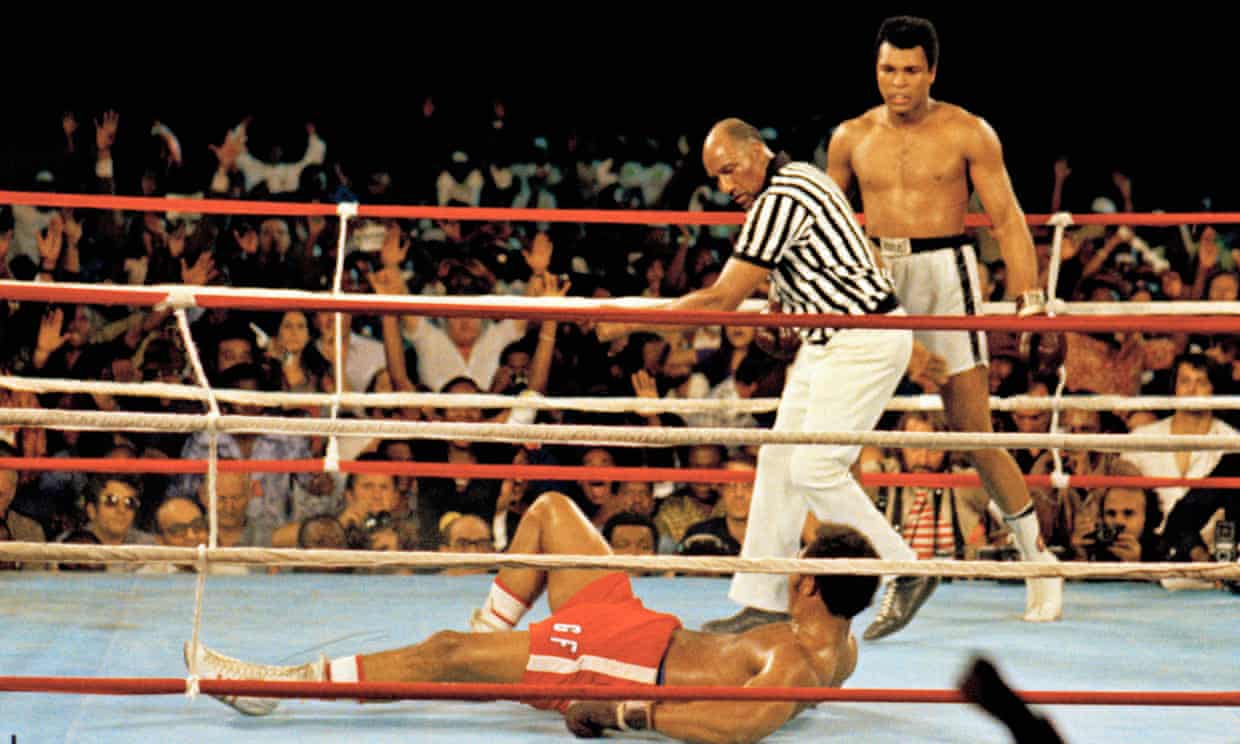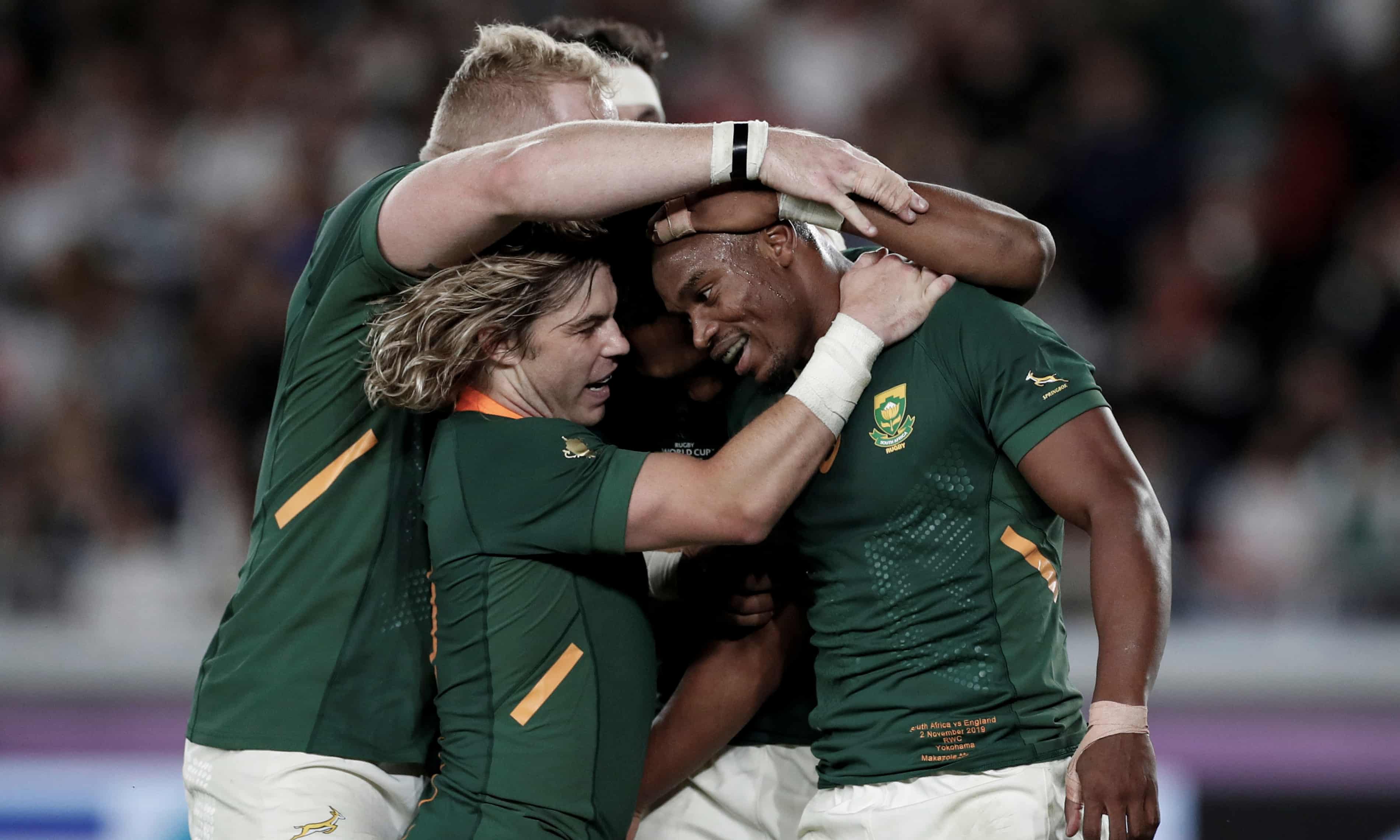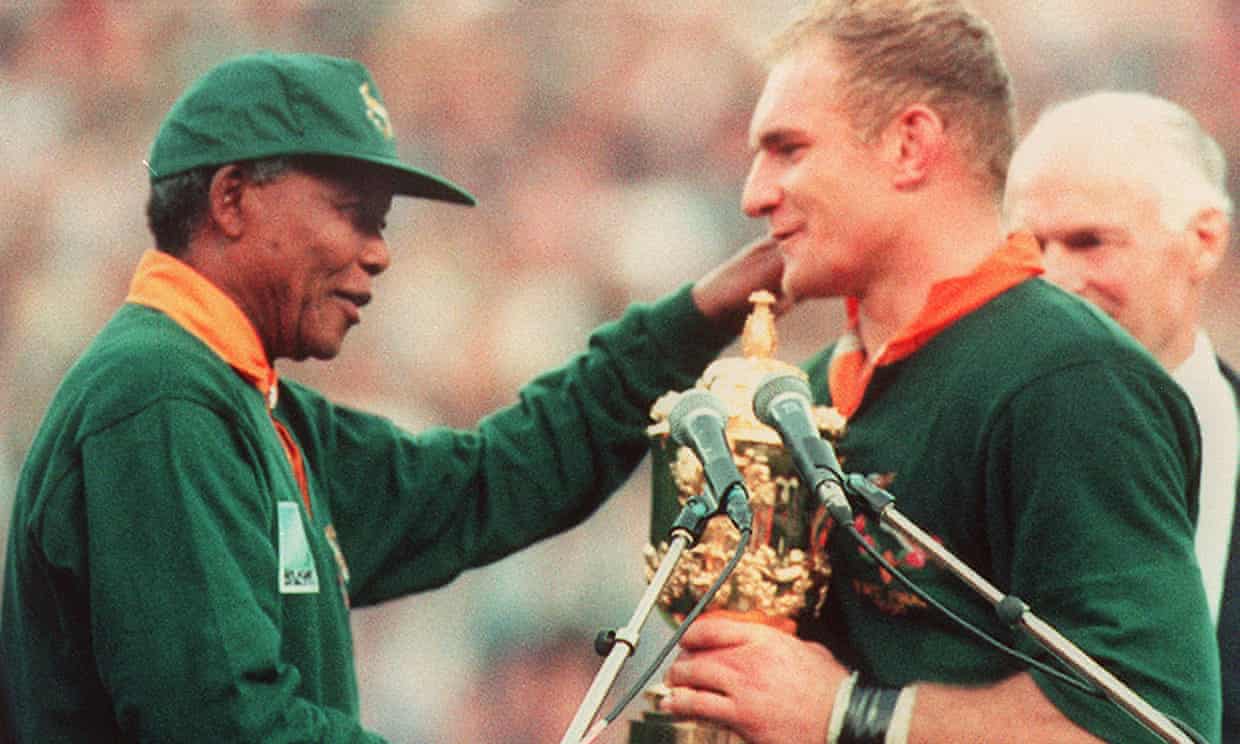
What are your favourite book/magazine/article on sports?
Source: https://www.theguardian.com/books/2019/nov/02/the-best-books-about-sports-biggest-day
Rugby, races and the rumble in the jungle: the best books on the biggest days in sport
Ahead of the rugby world cup final, Nicholas Wroe celebrates sporting landmarks in literature
Nelson Mandela with Springbok captain Francois Pienaar at the 1995 rugby world cup final. Photograph: Philip Littleton/AFP/Getty Images
The presence of South Africa in today’s rugby world cup final against England is undoubtedly a source of great pride for the team and their supporters. But no matter how thrilling the match, or whatever the result, the occasion will never match the drama, emotion, cultural symbolism and political impact of their appearance in the 1995 final.
They played at Ellis Park, Johannesburg, the spiritual home of Afrikaner rugby and, by implication, white supremacy, South Africa beat New Zealand that day. More importantly Nelson Mandela, president for just over a year, chose to greet the teams and present the trophy wearing the green-and-gold jersey of the once-hated Springboks, and in so doing established a key staging post on the journey to a post-apartheid society.
John Carlin’s gripping account of the event, Playing the Enemy, later made into the film Invictus, skilfully probes the politics and personalities behind that day to show how it became one of the most potent political moments of the century.
Cup finals in fiction are comparatively rare – and what novelist would dare concoct such pitch-perfect choreography and moral courage as Mandela’s intervention – but JL Carr’s How Steeple Sinderby Wanderers Won the FA Cup is a minor classic. On the surface a daft tale about how a village team beat the big boys and made it all the way to Wembley, it is also a sly state of the nation novel that, with eerie prescience, challenges media and metropolitan pretensions from the viewpoint of the neglected and patronised rural edges of England.
Not every sport has a cup final, but most have set-piece moments of truth, big days that decide who is the best, and writers have long been drawn to them both to recall the action and to consider wider perspectives. Among the most successful efforts was Nick Hornby’s Fever Pitch, his reinvention of the memoir through the prism of Arsenal matches. Fascinating in a different way was Norman Mailer’s The Fight, about the 1974 rumble in the jungle heavyweight boxing title fight in Kinshasa, Zaire, between Muhammad Ali and George Foreman. Mailer’s egotistical swagger theatrically captured the moment (and, in hindsight, also provided a revealing snapshot of 70s mind-sets, preoccupations and prejudices).

Track cyclist Victoria Pendleton’s cup finals came in the form of world championships and Olympics at which, over a long career, she won more than her share. But what makes her autobiography, Between the Lines, written with Donald McRae, so compelling is not her graphic depictions of training and competing – revelatory as they are – but the raw honesty with which she explores issues such as her lack of confidence, her status as a woman in a male dominated world and the physical and mental price she paid for her success. A rare glimpse of human frailty behind athletic dominance and strength.
There are few one-off sporting events that command more global attention than the Olympic 100m final. But what are the consequences of such intense focus? Richard Moore’s The Dirtiest Race in History is an enthralling investigation of the 1988 men’s final in Seoul, which apparently saw a remarkable world record set by Ben Johnson. However, within 48 hours the sense of wonder had soured as Johnson failed a drugs test, and in the years following, only two of the eight competitors were not associated with doping. A dark reminder that when the stakes are at their highest, sport is not always just a game.
RUGBY WORLD CUP

When South Africa won again the Rugby World Cup last week, we all remembered the film Invictus, by Clint Eastwood which depicts the first time they did back in 1995.
https://youtu.be/mlZTzsC8e4g
I also want to recommend the book on which the film was based. I liked it to much that after reading it in Spanish, I bought it in English.
This piece of news by The Guardian newspaper shows the story of the tournament in pictures and quotes.
https://www.theguardian.com/sport/2019/nov/04/rugby-world-cup-2019-the-story-of-the-tournament-in-pictures-and-quotes
It's astonishing the different of white and black players back in the South African Rugby Team back in 1995 and in the one that won a few days ago. This sport was usually played only by white men -in a country of black majority, but not today.
How was this change possible?
How do you use important sports events in the class?
,
SOCCER or FOOTBALL?
Enrique Pérez:
"I like to use videos to explain in another way what the teacher can explain, I also like to use English videos subtitled in English for students to practice the language.
In this case I use a video explaining the words of the soccer field and the rules of soccer."
https://www.youtube.com/watch?v=BMTfKWK_EeA&t=49s
JUMP ROPE TRICKS
Source provided by Silvia González
THE POWER OF ALTERNATIVE SPORTS
Source provided by Jorge Peña
PARKOUR
https://www.britannica.com/sports/parkour
https://parkourgenerations.com/parkour-history/
Juan Carlos Fernández introduces parkour with this video: https---m.youtube.com-watch-v=zv1Fuqhxia8feature=share.url
Provided by Javier Medina:
To learn the muscles and bones, I like that pupils do it with some games. This is a link with an example:
https://naturalsciences.didactalia.net/resource/muscular-system-front-view-easy/492e4ed1-eb67-4098-80b5-3b98647ac5e0
Games are the best friends for PE teachers.
To learn the muscles and bones, I like that pupils do it with some games. This is a link with an example:
https://naturalsciences.didactalia.net/resource/muscular-system-front-view-easy/492e4ed1-eb67-4098-80b5-3b98647ac5e0
Games are the best friends for PE teachers.
Students love them and help to get the main aim in our classes, "keep everyone moving the maximum amount of time".
Some of the are free, some not, but is worthy.

This is another interesting page with lots of resources:traditional P.E. games, modern ones, traditional sports, videos and more links inside:
https://teens.lovetoknow.com/teen-activities/fun-physical-education-games-high-school-students
https://teens.lovetoknow.com/teen-activities/fun-physical-education-games-high-school-students
Shared by Mónica Martínez (P.E. teacher and online course tutor):
Activities in small spaces when the weather is not good and you don't have the gym. This is our common nightmare.
You need to find activities to do in their classes, but you don't want to waste your activity time.
TAPPING ACTIVITIES to develop coordination:
https://youtu.be/IDvIo_LRIZ4: to understand what I'm talking about
https://www.youtube.com/watch?v=Y5kYLOb6i5I : to do in class when it's raining. With this tutorial, you will learn how to do it.
https://www.youtube.com/watch?v=bmFe7SV4LIo : the same, but in couples (it's more difficult to follow).
https://www.youtube.com/watch?v=cmSbXsFE3l8 : The top, in a song with Anne Kendrick
https://www.youtube.com/watch?v=I62vz9sO1Tc : if you want a show for the school
TAPPING ACTIVITIES to develop coordination:
https://youtu.be/IDvIo_LRIZ4: to understand what I'm talking about
https://www.youtube.com/watch?v=Y5kYLOb6i5I : to do in class when it's raining. With this tutorial, you will learn how to do it.
https://www.youtube.com/watch?v=bmFe7SV4LIo : the same, but in couples (it's more difficult to follow).
https://www.youtube.com/watch?v=cmSbXsFE3l8 : The top, in a song with Anne Kendrick
https://www.youtube.com/watch?v=I62vz9sO1Tc : if you want a show for the school
4. DANCE
Provided by Javier Miguel Viñuela:
4.1 How to choreograph a dance (difficult for students, interesting for teachers):
4.2 Body live class: https://www.youtube.com/watch?v=KxfcndYWRx4
4.3 Zumba: https://www.youtube.com/watch?v=r09zk5mp_Nk
4.3 Bailes de Salón con Pol Chamorro: https://www.youtube.com/watch?v=WhTlunmkibk
3. BASKET:
3.1 (provided by Sara Rodríguez)
https://www.basketballforcoaches.com/basketball-history/
3.2 (provided by Miguel Viñuela): https://dialnet.unirioja.es/descarga/articulo/5370986.pdf
3.3 An extra help for your baskball classes: basketball
2. COLPBOL: collective sport created by a Physical Education teacher called Juanjo Bendicho in Valencia, Spain, in 1997 ( resource provided by David Martín).
3.1 (provided by Sara Rodríguez)
https://www.basketballforcoaches.com/basketball-history/
3.2 (provided by Miguel Viñuela): https://dialnet.unirioja.es/descarga/articulo/5370986.pdf
3.3 An extra help for your baskball classes: basketball
2. COLPBOL: collective sport created by a Physical Education teacher called Juanjo Bendicho in Valencia, Spain, in 1997 ( resource provided by David Martín).
1. KIN-BALL: Mario Demers invented this sport for P.E. It began in 1986 in Quebec. (resource provided by Natalia LLorente)
Official web page
https://www.omnikin.com/
http://www.thearcherygame.com/kinbal
VOLLEYBALL, by Jose Mª de de las heras, click here for the activity.
YOGA:
If you don't know anything about yoga, this is your opportunity: Yoga
VOLLEYBALL, by Jose Mª de de las heras, click here for the activity.
YOGA:
If you don't know anything about yoga, this is your opportunity: Yoga
ORIENTEERING:
There were incredible people doing this content. Have a look at their their work.
SWIMMING:
GYMNASTICS: It's not so difficult. Let's try.
fitness documents
BADMINTON: Good ideas for badminton
TRACK AND FIELD / ATHLETISM
Track and field information
ACROSPORT NOTES
Here you will find a very good Acrosport presentation.
acrosport. By Sonia Mirás IES LA ARBOLEDA
























No hay comentarios:
Publicar un comentario